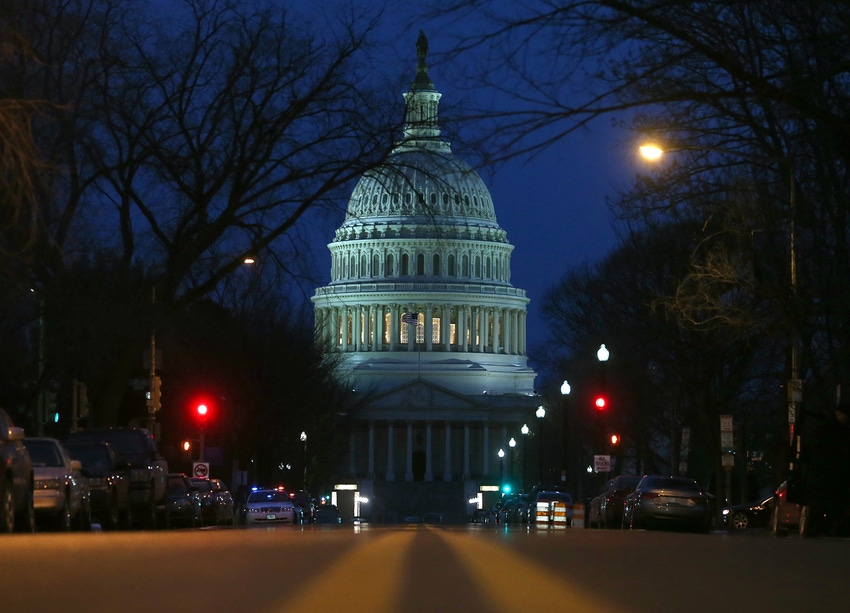House follows party line to pass farm bill
Legislative Watch: House farm bill includes FMD vaccine bank funding; tariffs tit-for-tat; livestock transportation working group to be formed.

The U.S. House of Representatives on its second try passed the farm bill by a party-line vote 213-211. The bill failed on May 18 because a number of conservative Republicans voted against the bill to force a vote on the Goodlatte immigration bill which was defeated yesterday.
The National Pork Producer Council came on board praising the House’s action, especially since the bill contains several provisions important to U.S. pork producers.
Chief among the important provisions is language establishing and funding a foot-and-mouth disease vaccine bank. FMD is an infectious viral disease that affects cloven-hooved animals, including cattle, pigs and sheep. Though FMD is not a food safety or human health threat, it would be financially devastating to U.S. agriculture if an outbreak were to occur here due to the closing of export markets.
The NPPC is asking lawmakers for funding in each year of the next farm bill of $250 million — $150 million for the vaccine bank, $70 million for state block grants for disease prevention and $30 million for the network of laboratories that provide disease diagnostic support.
The House version of the five-year agricultural blueprint includes those amounts only for the first year; for each of the other years, it has $30 million for state block grants and $20 million to be used at the agriculture secretary’s discretion for the grants, labs and the vaccine bank. While the Senate legislation calls for an FMD vaccine bank, it includes money only for the labs.
Trade war heats up as Trump calls for more tariffs on China
President Trump has directed his administration to come up with a list of an additional $200 billion worth of Chinese products that would be hit with a 10% tariff. This is a response to China announcing it would retaliate in kind to Trump’s announcement last week to place a 25% tariff on $50 billion of Chinese goods.
Trump says, “This latest action by China clearly indicates its determination to keep the United States at a permanent and unfair disadvantage, which is reflected in our massive $376 million trade imbalance in goods. This is unacceptable. Further action must be taken to encourage China to change its unfair practices, open its market to United States goods, and accept a more balanced trade relationship with the United States.”
If China responds to this latest threat, Trump says he will seek tariffs on an additional $200 billion worth of products. If this happens, the United States would have tariffs on $450 billion out of the $505 billion, or 90%, of the Chinese products imported by the United States.
China’s Commerce Ministry says after Trump’s latest announcement that “if the U.S. side becomes irrational and issues a list, China will have to adopt comprehensive measures combining quantity and quality to make a strong countermeasure.”
The two countries have until July 6 to try and avoid tariffs taking affect. Time is running out and U.S. agriculture will bear the brunt.
China hits 294 ag products with tariffs
China responded to President Trump’s decision to hit China with tariffs by announcing it would begin imposing a 25% tariff on 294 U.S. agricultural products worth $34 billion. The products include soybeans, beef, pork, poultry, dairy products, corn, cotton, ethanol, dried distillers’ grains, wheat, whiskey, cigars, lobsters, salmon, orange juice, fruits, vegetables and tree nuts. The tariffs are scheduled to begin July 6.
The new list includes the original 33 agricultural products announced in April, plus an additional 261 agricultural products. Still to be determined is if a product is on both lists, will it be subject to the combined tariff from the two lists, or the higher of the two.
China says it “doesn’t want a trade war” but it has to “fight back strongly.” The Chinese Commerce Ministry says China was ending the proposed agreement to purchase more U.S. agricultural products, natural gas and other products.
A number of the U.S. products China selected to hit with tariffs can be replaced by imports from other countries such as Brazil and Australia.
EU announces tariffs against the U.S.
The European Union announced it was hitting $3.2 billion of U.S. products with tariffs in retaliation to the tariffs the Trump administration placed on imported steel and aluminum. A 25% tariff will be placed on various products including whiskey, tobacco, Harley Davidson motorcycles and peanut butter.
Livestock transportation bill
The “Modernizing Agricultural Transportation Act,” by Sens. John Hoeven (R-ND) and Michael Bennet (D-CO) would establish a working group at the Department of Transportation to identify the obstacles the federal Hours of Service rules and the Electronic Logging Device regulations impose to the safe, humane and market-efficient transportation of livestock. The bill would delay the ELD regulations until DOT proposes reforms.
The working group which is to be comprised of transportation and agriculture representatives along with USDA is to report within one year on proposed guidelines for regulatory or legislative action. The group is required to consider:
• The impact, incompatibilities and other challenges and concerns of existing HOS rules and ELD rules under the Federal Motor Carrier Safety Administration on the commercial transport of livestock, insects and agricultural commodities.
• Initiatives and regulatory changes that maintain and protect highway safety and allow for the safe, efficient and productive marketplace transport of livestock, insects and agricultural commodities.
• Other related issues that the Transportation secretary considers appropriate.
After receiving the working group’s report, DOT must propose regulatory changes to the HOS and ELD regulations, taking into account the findings and recommendations of the working group.
The bill is supported by the American Farm Bureau Federation, National Cattlemen’s Beef Association, National Pork Producers Council, Livestock Marketing Association and U.S. Cattlemen Association.
Information from the National Pork Producers Council was added to this column.
About the Author(s)
You May Also Like



